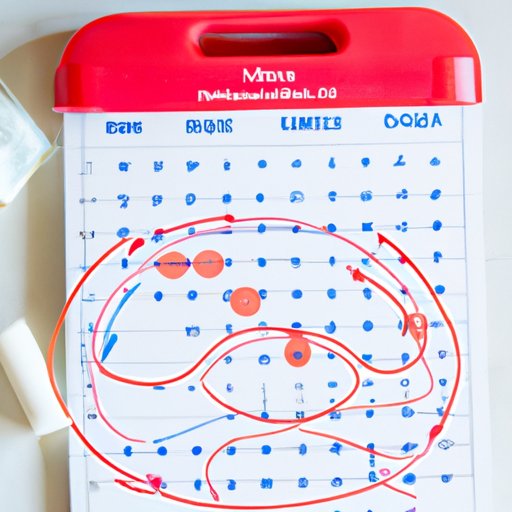Introduction
Infertility is defined as the inability to conceive after a year of unprotected sex. It affects around 12% of couples of reproductive age, and can be caused by a number of different factors. If you’re trying to conceive but have had no success, it’s important to understand how to tell if you are infertile so that you can seek out the proper medical help.

Visit a Fertility Specialist for Testing and Evaluation
The best place to start is with a visit to a fertility specialist. This type of doctor specializes in diagnosing and treating infertility. During your appointment, they will perform tests and evaluations to determine if there is an underlying issue that is causing your infertility. Tests may include blood tests to check for hormone levels, ultrasound scans to look for physical issues, and other tests depending on your symptoms and medical history.
The benefits of seeking professional help from a fertility specialist are numerous. They can provide you with a comprehensive evaluation of your overall fertility and help you understand why you might be having difficulty conceiving. Plus, they can provide you with recommendations for treatment options that can help improve your chances of getting pregnant.

Track Your Menstrual Cycle and Look for Irregularities
Tracking your menstrual cycle is one of the easiest ways to tell if you are infertile. You should keep track of the length of your cycle, the date of your last period, and any other symptoms you experience. As you track your menstrual cycle, look for any irregularities that could indicate infertility. Common irregularities include cycles that are shorter than 21 days or longer than 35 days, irregular bleeding, or spotting between periods.
If you notice any irregularities in your cycle, you should speak to your doctor. They may be able to provide you with further testing to determine if there is an underlying cause. Additionally, they may recommend lifestyle changes such as exercising more or eating a healthier diet, which can help regulate your menstrual cycle and improve your chances of getting pregnant.
Monitor Changes in Your Cervical Mucus
Monitoring changes in your cervical mucus is another way to tell if you are infertile. Cervical mucus is the fluid secreted from the vagina during ovulation. It changes consistency throughout the month, becoming thicker and stickier when you are not fertile and thinner and more slippery when you are ovulating. Tracking the consistency of your cervical mucus can help you determine if you are ovulating and therefore give you an indication of your fertility.
To monitor changes in cervical mucus, pay attention to the color, texture, and amount of discharge you experience each day. When you are not ovulating, the mucus will be thick and sticky, while when you are ovulating, it will be thin and slippery. If you notice that your cervical mucus does not change in consistency over time, it may be a sign of infertility.
Check Your Basal Body Temperature Each Morning
Your basal body temperature (BBT) is the temperature of your body at rest. It can be used to track your fertility and is often used in combination with tracking your menstrual cycle and cervical mucus. To check your BBT, take your temperature first thing in the morning before you get out of bed. Do this every day for several months to get an accurate picture of your fertility. If you notice that your temperature does not vary over time, it may be a sign of infertility.
It’s important to note that charting your BBT alone is not enough to determine if you are infertile. You should use it in conjunction with other methods such as tracking your menstrual cycle and monitoring changes in cervical mucus. Additionally, if you are taking any medications or using any contraceptive methods, they can affect your BBT and should be taken into consideration when interpreting the results.

Consider Lifestyle Factors like Diet and Exercise
Diet and exercise are two lifestyle factors that can affect your fertility. Eating a balanced diet that is rich in fruits, vegetables, and whole grains can help regulate your hormones and improve your odds of conception. Exercise is also important for fertility as it can help reduce stress levels, improve circulation, and regulate hormones. Aim for 30 minutes of moderate exercise per day.
Additionally, avoiding certain substances such as alcohol, cigarettes, and drugs can help improve your fertility. These substances can interfere with your hormones and have a negative impact on your fertility. If you are having difficulty conceiving, it is best to avoid these substances to ensure that your body is in the best condition possible for conception.

Look for Signs of Hormonal Imbalances
Hormonal imbalances can lead to infertility, so it’s important to look for signs that you may be experiencing one. Common signs of hormonal imbalance include irregular periods, acne, excessive hair growth, and weight gain. If you are experiencing any of these symptoms, it’s important to speak to your doctor. They can order tests to determine if there is a hormonal imbalance and provide you with treatment options if needed.
Get a Semen Analysis to Test Sperm Count and Motility
In order to determine if there is an issue with sperm count or motility, it is important to get a semen analysis. A semen analysis is a test that measures the quantity and quality of sperm in a sample of ejaculated semen. It can help determine if there is a problem with sperm count or motility, both of which can contribute to infertility. Speak to your doctor about getting a semen analysis if you are trying to conceive.
Conclusion
Infertility is a common issue for many couples, but it doesn’t have to be a source of frustration and confusion. By understanding how to tell if you are infertile, you can take the necessary steps to seek out professional help and improve your chances of getting pregnant. Visit a fertility specialist for testing and evaluation, track your menstrual cycle and look for irregularities, monitor changes in cervical mucus, check your basal body temperature each morning, consider lifestyle factors like diet and exercise, look for signs of hormonal imbalances, and get a semen analysis to test sperm count and motility. Remember, if you are having difficulty conceiving, don’t hesitate to seek out professional help.
(Note: Is this article not meeting your expectations? Do you have knowledge or insights to share? Unlock new opportunities and expand your reach by joining our authors team. Click Registration to join us and share your expertise with our readers.)
